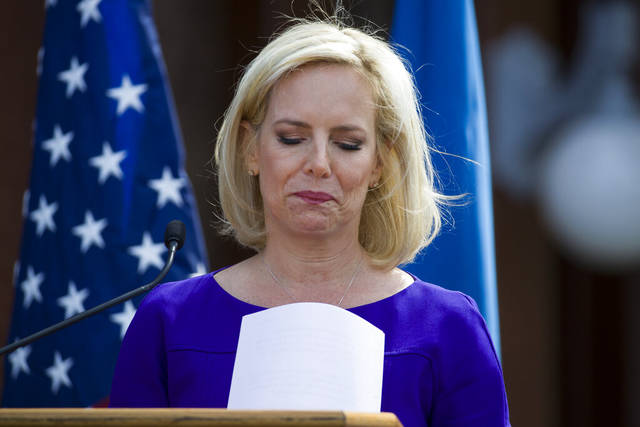https://naviga.triblive.com/news/politics-election/former-dhs-head-kirstjen-nielsen-took-up-cyber-despite-white-house-aversion/
Former DHS head Kirstjen Nielsen took up cyber despite White House aversion

WASHINGTON — A top White House official told Kirstjen Nielsen, then Homeland Security secretary, not to bring up election security with President Trump, steering her away from discussing a critical national security threat with a president who bristles at suggestions that Russian interference contributed to his 2016 victory, according to two people familiar with the matter.
One official said the guidance from acting chief of staff Mick Mulvaney wasn’t related to the sensitivity of the election interference issue, but to keep the White House meetings concentrated on border security, the most visible part of Nielsen’s sprawling portfolio and the top item on Trump’s political agenda.
But it suggests a lack of White House focus on preventing cyberattacks, which Nielsen described during her tenure as a bigger terrorism threat to the United States than planes or bombs. The potential for foreign cyberattacks to shape U.S. elections has been in the spotlight as special counsel Robert Mueller’s report outlined efforts made by Russia to steal thousands of emails and internal documents from the Democratic Party and the Clinton campaign in 2016.
Before Kirstjen Nielsen was forced to resign, she tried to focus the White House on insulating the 2020 elections from Russian interference. “President Trump’s chief of staff told her not to bring it up in front of the president.” https://t.co/FBtOzNHwlx— Tim O'Brien (@TimOBrien) April 24, 2019
Despite the lack of White House coordination, Nielsen continued to work on election and cybersecurity with other administration officials, according to people familiar with the matter. They spoke on condition of anonymity because they were not authorized to discuss private meetings.
The New York Times was the first to report that Nielsen had been told not to talk about the topic.
Mulvaney said in a statement he did not recall any meetings in which he told Nielsen not to bring up election security, and stressed the topic was very important. Trump signed an executive order last fall authorizing sanctions against foreigners who meddle in U.S. elections and requested $17.6 billion for federal cybersecurity efforts next year in his budget. Mulvaney added that federal, state and local governments are now sharing intelligence and federal authorities are conducting security breach training drills.
“The Trump administration will not tolerate foreign interference in our elections, and we’ve already taken many steps to prevent it in the future,” he said.
“We have a president who came to power with the help of a foreign adversary … And lo and behold, he continues to do very little himself or nothing personally to defend us,” says ex-CIA officer and former presidential candidate @EvanMcMullin. https://t.co/OQoxo7gHt4 pic.twitter.com/8UYkfnn0ll— CNN Newsroom (@CNNnewsroom) April 24, 2019
Still, Trump and his aides have said Russia’s 2016 interference was exaggerated. Jared Kushner, the president’s son-in-law and senior adviser, on Tuesday during an interview at the Time 100 Summit in New York minimized Russia’s involvement by describing it as “buying some Facebook ads to try to sow dissent.”
“But I think the investigations, and all of the speculation that’s happened for the last two years, has had a much harsher impact on our democracy than a couple of Facebook ads,” he said.
Nielsen resigned April 7 after a rocky 16-month tenure and amid a staff shake-up at her department orchestrated by the White House frustrated by the surging number of Central American migrants crossing the U.S.-Mexico. Trump named as acting secretary Kevin McAleenan, the head of U.S. Customs and Border Protection, who has little cyber experience. He has since attended meetings on cybersecurity and is working to get up to speed on the topic, aides said.
Nielsen, in meetings with Trump, would attempt to explain to the president that her department was responsible for much more than immigration, according to two people familiar with the matter. But Trump’s staff, dealing with a president with a short attention span and a focus on border security, would push her to stay on topic.
Another person said Nielsen took the issue up herself, convening classified meetings with agency heads and Cabinet secretaries, and cross-government strategy sessions with FBI, Justice Department and intelligence officials to chart a path forward on cybersecurity and election security.
"If somebody came to me under those circumstances, I’d be inclined to report them to the appropriate government authorities and deal with them at arm's length at best through our own government." —@SenMikeLee when asked if hacked information is okay. pic.twitter.com/aIxrEUvTNV— Morning Joe (@Morning_Joe) April 24, 2019
Garrett Marquis, spokesman for the White House’s National Security Council, said any suggestion that the administration is giving less than a “than a full-throated effort to secure America’s elections” was patently false.
“National Security Council staff leads the regular and continuous coordination of the whole-of-government approach to addressing foreign malign influence and ensuing election security,” he said.
The 2018 midterm elections passed with no major disruptions to election infrastructure, though thousands of emails were stolen from aides to the National Republican Congressional Committee by an “unknown entity,” federal officials said.
And intelligence agencies constantly warn about the potential for foreign interference.
Chris Krebs, the head of cybersecurity and infrastructure security agency at Homeland Security, has said he thought it possible that the 2018 elections were largely spared in part so foreign agents could save their gunpowder for 2020. Speaking to the Atlantic Council’s International Conference on Tuesday, Krebs said the most active cyber threats come from Russia and China, while on the lower end are Iran, North Korea and “then the extremists pace.”
He said the U.S. has made progress, especially on information sharing, but that’s the “minimum bar.”
“We have to get beyond information sharing … to operationalizing information security,” he said.
Copyright ©2026— Trib Total Media, LLC (TribLIVE.com)
